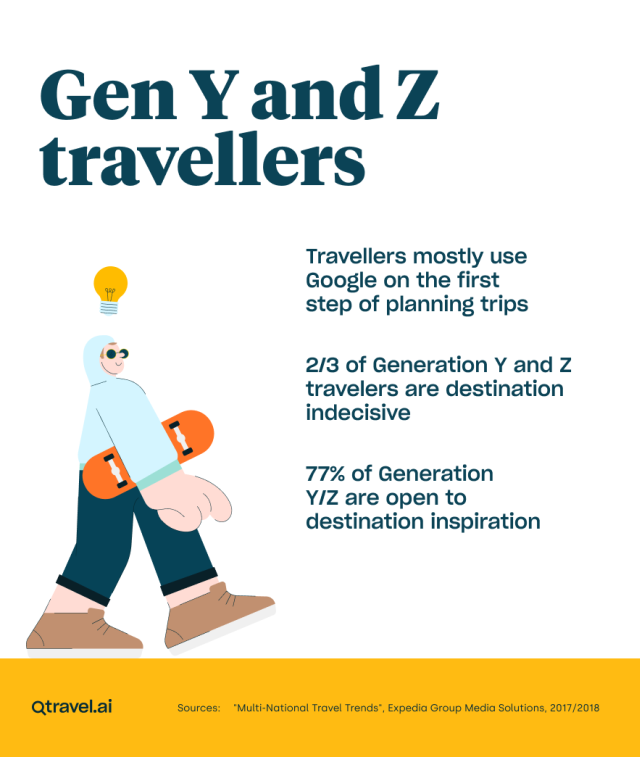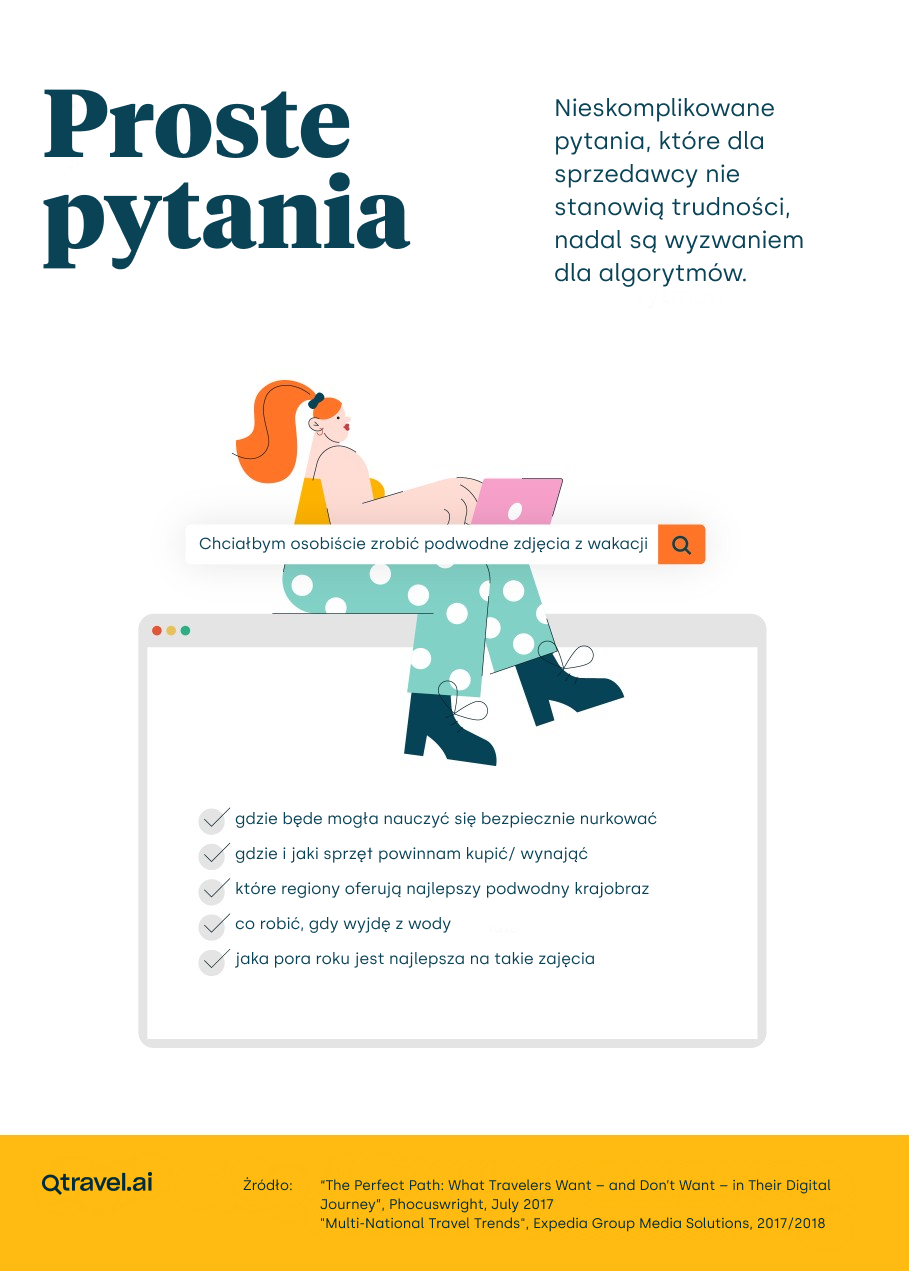Information is an important resource. But it is not a scarce resource, so it is not as valuable as it seemed to be in the 20th century (then visions of information economics emerged, in which access to information was to determine market power). Meanwhile, in order to give actual power (value) to information, it must be properly processed, i.e. selected and interpreted. This requires the right tools and competences. A tourist flooded with information has the feeling of being overloaded with it, but ultimately comes to the conclusion that he still does not know anything and is unable to make a choice without fear that he will soon regret it (because, for example, he will find a better offer in a moment). As a result, he is dependent on marketers, who are in turn increasingly often replaced by algorithms. There would be nothing wrong with that (after all, algorithms are responsible for the automation of processes, and thus savings), if these algorithms took into account the real needs and desires of buyers. This works well in some areas of trade. For example, it is possible to determine a person’s taste for books, films, clothing, footwear, preferred food, cosmetics and even interior design based on past purchases. So why doesn’t it work in tourism?
Cold, cold… getting warmer
In search of diversity and constant change, tourists expect more and more new stimuli. Their social environment which they want to impress is a significant reason: after all, tourism is a perfect object of the so-called ostentatious consumption (‘snob effect’). However, it is difficult to impress others by routinely visiting the same places (this is the mode preferred by families with small children).
Ostentatious consumption therefore leads to ‘destination hopping’ (constant search for new destinations) and ‘platform hopping’ (moving from one internet platform to another, in search of new ideas, stimuli, impressions, inspiration). This means that even such large portals as Booking or Expedia face the problem of the ‘cold start’: perhaps a given tourist has already made reservations through them more than once, but it does not mean that the collected data will facilitate the prediction of where he/she is going to travel next time. The tourist might have spent days or weeks browsing blogs and surfing the websites of unbelievable destinations – the intensive work that the tourist performs outside the booking portal then requires translating dreams into the real solutions: appropriate accommodation, transport, comparing hundreds of available offers, and matching them with the inspirations that previously appeared in the consumer’s mind.
Interesting is the mismatch between inspirations (usually obtained from sources other than an on-line agency) and the technical aspect of the actual booking. If you have any experience with traditional travel agencies (as a seller or buyer), you probably remember that talking to a customer in a travel agency usually consisted of constantly combining these two aspects – the agent’s job was to quickly transform dreams into real solutions. In the course of the conversation, a good salesperson got to know the customer well enough to be able to advise her/him, and he showed empathy instead of recommending her/his own passion. A ‘cold start’ was tamed and warmed thanks to the presence of a human and dynamic communication based on hundreds of words that described the expectations of the buyer, often very emotionally tinged, which the seller could translate into the language of catalogue offers: to select specific data about the destination and nature of the trip, its participants, dates, budget restrictions, etc.
‘Black box’
Meanwhile, in an on-line agency, the customer has to fill in a form and wait for the result which the ‘black box’, unaware of who is sitting in front of the monitor and what her/his plans and dreams are, will spit out. New tourists are increasingly less satisfied with such a solution: surfing the web alone in search of inspiration can be considered enjoyable, but the consecutive days spent on fruitless attempts to find an adequate offer, maintaining the feeling that we have not been fleeced, and the frustration that comes when we realize that our plans are slowly being restricted (because there are no connections, no beds available, some hotels do not accept dogs, or they have no vegan menu) – they strip your holiday plans of fantasy and charm, instead of being an introduction to extraordinary experiences.
Therefore, new tourists will browse the web to find a service provider who, like a good traditional seller, will combine two aspects of preparation for a trip into one coherent, attractive and unforgettable whole: the search for inspiration related to personal interests must be combined with the automatic indication of all available, personalized and fully up-to-date package options. What’s more, it should be done within one platform, because a tourist looking for inspiration outside a given online agency will forever remain a mystery and the problem of ‘cold start’ will never be solved. The very process of searching for these inspirations and solutions cannot be based on a pile of forms: in the era of increasingly perfect chatbots, and trust in the possibilities of artificial intelligence, new tourists expect at least an intermediate solution: ‘someone’ they can ask a natural question and receive a natural answer. It is best if this ‘someone’ is a smartphone (application) accompanying us at any time of day or night.

The way in which data is collected and approved, who manages it, and how she/he controls it, determines the share of individual entities in the created value pool. If you want to create and monetize value – you must be able to listen to the needs of tourists and make them feel that your proposal exactly suits them. We have been doing this for thousands of years in interpersonal relations, because it is supported by natural language and human empathy. It’s time to implement these competences in the world of tourist e-commerce.
Tools for people or people for tools?
The increasing availability of information does not make it easier for Internet users to plan their holidays more efficiently or less frustratingly. The Internet did not bring about the expected reduction in information asymmetry. The improvement of the service and online interaction, as well as the availability and verification of information on tourist offers still remains a challenge. Therefore, when planning a development strategy in a changing technological environment and complex tourism reality, intermediaries must think in advance about how the future behaviour and preferences of travelers will be shaped. Agencies that were able to find themselves in the world of new technologies managed to reduce operating costs and at the same time increase the number of interactions with customers. Another business challenge is to improve customer satisfaction and the dynamics of communication on the basis of natural language, which has been known to people for thousands of years.
The ability to examine the consumer with the use of forms is not a source of competitive advantage – the key success factor is the ability to inspire consumers to take actions by selecting the appropriate offer. The whole process – from tentatively formulated dreams, through precise planning, to the stage of booking – should be carried out in one smooth sequence of activities that will allow the user to save time, reduce uncertainty, and obtain maximum information online in one place. This is even more of a challenge, as sudden inspiration that is not based on previous tourist experiences means an avalanche of questions that should be anticipated by a virtual tourist agent. If the tourist’s plan is simple and flimsy (“I would like to have underwater vacation photos taken personally’), some practical issues will appear: (1) where can I learn diving safely, (2) where and what equipment should be bought / rented, (3) which regions offer the most interesting underwater landscapes, (4) what will I do in a given region when I get out of the water, (5) what time of the year is the best for such activities, etc. An agent who expects that, from the level “I want to have such pictures”, the tourist will jump to the level of reliable planning of details, is making a mistake. Tourists who crave impressions, changes, and madness, outline general visions under the influence of inspiration and leave details to service providers. Thinking about details becomes a source of value that traditional salespeople do well, unlike algorithms, which handle it (so far) quite badly. Therefore, it is worth reaching for a cake that has not yet been picked up by anyone.

The fact that the most active tourists are diligently looking for diversity and new experiences is an additional argument. Their tourism activity goes hand in hand with technological openness: heavy travellers are usually the first to discover new places, new applications and new gadgets. If we add that this group of buyers represents the most affluent consumers and, in addition, is the most willing to spend significant amounts of money on leisure as part of the household budget (even at the expense of other purchases, as declared by every other heavy traveller) – then we have a set of data to recognize this segment as especially desirable.
[1]A cold start with regard to searching for offers means that past purchasing behaviour (historical data) cannot be extrapolated to future purchases. In the case of tourism, this phenomenon is strongly felt in the case of those who travel a lot and intensively, but are constantly looking for new destinations and new inspirations. Previous purchases are not sufficient to predict future purchases (this term comes from the term ‘cold reading’, which is a collection of techniques used by magicians and fortune-tellers to identify and provide details about other people, often to convince them that the reader knows much more about them than is actually the case).
